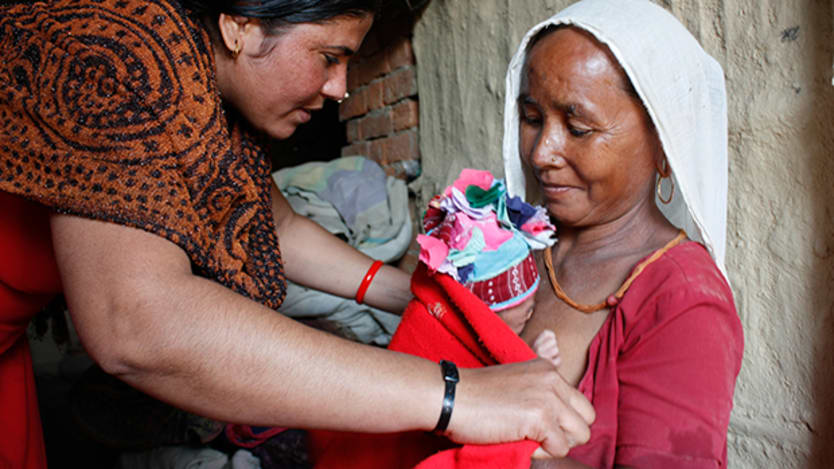
Innovation can happen in unexpected places. The slums of Dhaka might not seem an obvious location; but the nongovernmental organization BRAC has there developed its integrated maternal health program, which provides access to safe delivery and health workers use mobile phones to collect patient data.
This program is among the clutch of brilliant ideas that have won GSK and Save the Children’s Healthcare Innovation Award in the two years since launch. The award is one element of GSK and Save the Children’s five-year partnership which aims to help save the lives of 1 million children.
Designed to identify those ideas born in developing countries that are saving children’s lives, the award aims to give them a springboard to expand their reach. There is much that government, business and NGOs can learn from these ideas and their capacity to think laterally about innovation in health care and improving access.
So what are the four key lessons learned so far from the so-called Oscars of health care innovation?
High-tech is not always high impact
Sometimes the simplest ideas are the best. Take Kangaroo Care, among the first winners of the HIA in 2013, for example. Pioneered in Colombia, it is a technique which recognizes that mothers can effectively act as human incubators, keeping their babies warm and regulating their heartbeats through skin-to-skin contact. Such an approach has already had a positive impact on reducing mortality rates in small babies.
When it comes to health care in developing countries, it pays to consider what is applicable in that environment — and what is already present, but could be repurposed in a different, more accessible way. We’re trying to do that better at GSK. Through our partnership with Save the Children, we’re developing a chlorhexidine gel in single-use sachets that, if approved, could be used in poorer countries to apply to freshly cut umbilical cords. Sepsis, often caused by umbilical cord infections, is one of the main causes of death in newborns in the developing world.
Mobile technology really does have huge potential
The mantra that mobile technology will transform health care in Africa is perhaps overused. But if the HIA winners are anything to go by, it really does have huge potential. The simple mobile phone or tablet can enable patients to access health care education; it can give health workers the information they need to diagnose and treat illnesses; and it can provide real-time health care data.
ZiDi illustrates the latter. Iit is a mobile health management system designed to enhance the quality of maternal and child care by providing access to real-time data to improve health planning decisions. ZiDi, which won HIA in 2013, has been adopted by the Kenyan Ministry of Health and is being rolled out in 5,000 public health facilities. If mobile technology is going to fulfil its potential and have an impact beyond the local, it needs to be scaled up in this way.
Good health care is about healthier lives and livelihoods
Last year, a portion of HIA went to Living Goods, which brings health services to people’s doorsteps in Uganda. Skilled microentrepreneurs — akin to “Avon ladies” — travel door-to-door teaching families how to improve their health, and diagnosing and treating patients. They also sell health products such as bed nets. Not only does this help improve the health of communities — community health promoters have delivered nearly 600,000 treatments — but also helps the entrepreneurs to earn a living.
GSK is adapting elements of this model through our partnership with Barclays, the financial services provider, in Zambia. There, we are working with CARE International — the NGO — to create a network of community health entrepreneurs. So far, we have 28 working door-to-door, selling health care products — and we plan to further develop the model and test out a social enterprise. This approach should help people access the care they need and also enhance the economic health of these communities.
The best ideas come from those closest to the challenge
Most importantly, HIA has taught us that the best ideas can come from those closest to the challenge. Tough conditions act as a hotbed for innovation, sparking ideas that can help save lives in developing countries because they are more responsive to that environment.
Some of these innovations could also have applications in developed health care systems, like the low-cost ‘baby bubble’ developed in Malawi to help infants with breathing difficulties. Pockets of excellence often stay just that, helping a fraction of the populations that could benefit from them. To transform access to health care, these small beginnings need funding, resources and profile to help them go further. At the same time, we need to consider what we can do within our own organisations to promote ‘grassroots’ innovation.
So this year, we are again running our HIA. As before, we are searching for ideas that have proven to reduce deaths among children under 5. But in 2015, we have a particular focus on identifying innovations that are helping to strengthen health care systems in developing countries and improve access to health care for pregnant women and children.
As the Ebola outbreak illustrated, fragile health systems are vulnerable to crises — which can quickly accelerate into a threat to social and economic stability. It is in all our interests to create robust health systems that enable communities to survive and thrive.
But there are many lessons to learn about how to create such robust infrastructures. This year’s award should provide an opportunity to reflect on those lessons and support innovative, responsive ways to help strengthen health care systems for good.
To read additional content on innovation, go to Focus On: Innovation in partnership with Philips.








